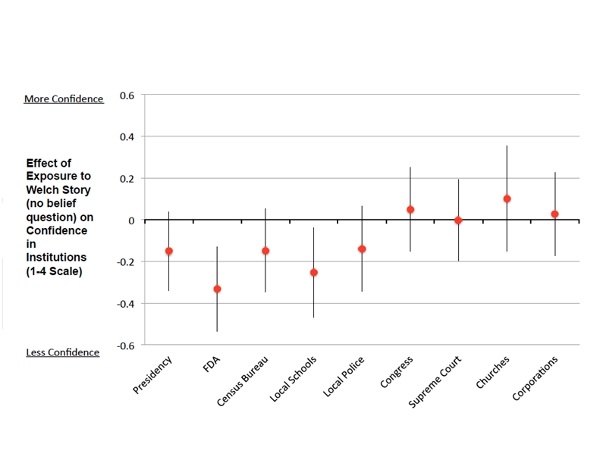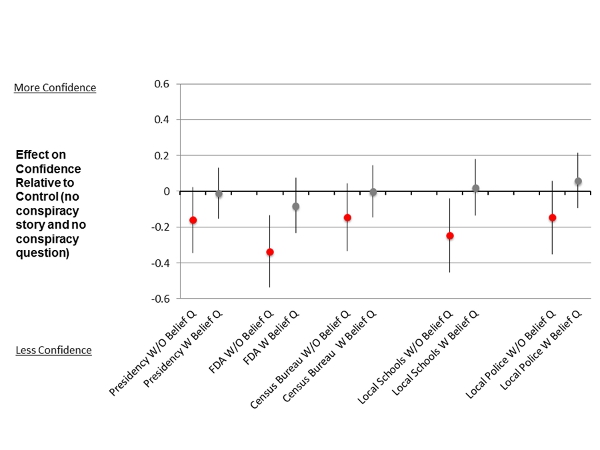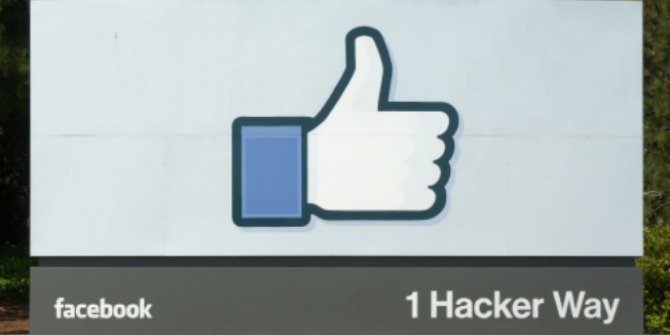
 Conspiracy theories are not new – from theories about the assassination of President John F. Kennedy to concerns that 9/11 might have been an ‘inside job’, alternative explanations about important events have an appeal to many parts of the population. In new research, Katherine Levine Einstein and David M. Glick find that people who are exposed to conspiracy theories tend to trust government less. In light of these findings, they argue that the media and scholars need to think more carefully about how the reporting of conspiracy theories shapes people’s relationship with democracy.
Conspiracy theories are not new – from theories about the assassination of President John F. Kennedy to concerns that 9/11 might have been an ‘inside job’, alternative explanations about important events have an appeal to many parts of the population. In new research, Katherine Levine Einstein and David M. Glick find that people who are exposed to conspiracy theories tend to trust government less. In light of these findings, they argue that the media and scholars need to think more carefully about how the reporting of conspiracy theories shapes people’s relationship with democracy.
Conspiratorial claims regularly make their way from the fringes into the mainstream media and political polls. Salient examples in U.S. politics in recent years and months include “9/11 truthers,” claims about climate scientists, beliefs that George W. Bush didn’t actually win Ohio in 2004, and fears that a recent training exercise (“Jade Helm”) was actually an Obama takeover of Texas. While it is certainly possible that, at times, news coverage of these events might help promote a more informed democracy—particularly if conspiracy theories are effectively refuted—our research demonstrates that it can have deleterious consequences. Specifically, we show that exposure a to conspiracy theory in a familiar “he said, she said” presentation—even if it is accompanied by a rebuttal—appears to reduce trust in government.
In our survey experiment, some participants were randomly assigned to read a straightforward newspaper article based on real news coverage of a conspiracy. Our article both described positive economic news and included the conspiratorial claim (propagated prominently by former CEO of General Electric, Jack Welch) that the Bureau of Labor Statistics (BLS) manipulated economic data for political reasons during the 2012 election season. Moreover, it featured a credible source calmly rebutting the claim, replicating the kind of point-counterpoint treatment omnipresent in contemporary media. (See Brendan Nyhan writing about exactly these issues in this case).
Regardless of their partisan affiliation, participants who read the article exhibited far lower levels of trust in a variety of government institutions than their counterparts who were not exposed to the conspiracy claim (see Figure 1). While previous psychological studies have found a link between belief in conspiracy theories and lower confidence in government, our research shows that merely hearing about a conspiracy claim in the mainstream media diminishes trust in government institutions both directly and indirectly implicated in the conspiracy.
Figure 1- Effect of reading of conspiracy claim on trust in a variety of government institutions.

Note: Results from seemingly unrelated regression models with controls for partisanship, age, political knowledge and racial resentment. Baseline is those who were not exposed to a conspiracy theory and not asked about their conspiracy beliefs. N=493.
Furthermore, we find that efforts to assess belief in conspiracies may undermine our ability to measure effects like the trust outcomes described above. In our experiments, some people were randomly assigned to be asked questions assessing both their belief in the conspiracy claim (after reading it) and their trust in government, while others who read the article were only asked about trust in government. The people who were asked about their belief in the BLS conspiracy did not experience any negative trust effects (see Figure 2). When combined with other results in the study, these findings suggest that asking people about conspiracy beliefs actually affects their answers and mitigates the adverse effects on trust. Unfortunately, the condition with the negative trust effects more closely mimics the real world in which people are not asked about their beliefs when confronted with a conspiracy claim. Since most surveys investigating conspiracy theories and similar concepts do, however, include questions about beliefs, our results indicate that these efforts likely understate (potentially dramatically) the extent to which conspiracies shape political and policy attitudes.
Figure 2 – Effect of being asked about conspiracy claim on trust in a variety of government institutions

What, if anything, can be done? It is obviously impossible to stop fringe (and sometimes not fringe) activists from making conspiracy claims. Ultimately, then, our research may have the most direct policy implications for the media. Members of the media have an important obligation to carefully evaluate claims about the major stories of the day. This kind of independent and balanced examination is a critical component of a functioning democracy.
However, the media could more carefully consider what kinds of claims warrant intense scrutiny. Our research shows that even a factually oriented newspaper article about a conspiracy theory –featuring an intelligent and plausible rebuttal — reduces trust in government. At a minimum, it appears that the “he said, she said” format does not effectively undermine the unfounded conspiracy claims.
In addition, the media, pollsters, and researchers need to consider what, exactly, about conspiracy stories is newsworthy and important to measure. It can be amusing to lampoon the American public by demonstrating that, say, X percent of adults believes in this or that ludicrous idea. Our research shows that asking such questions may miss the important consequences of conspiracy claims. Moreover, especially pertinent for academic researchers, this work also shows that asking about conspiracy beliefs after exposure to a claim can affect the measured results. Indeed, it may be, for example, impossible to accurately assess belief in conspiracy theories because asking about them affects responses.
Taking these trust and survey findings in concert, we encourage journalists, scholars, and the American public to think more carefully about how the reporting of conspiracy theories may shape Americans’ relationship with the democratic compact the next time a conspiracy emerges.
This article is based on the paper, ‘Do I Think BLS Data are BS? The Consequences of Conspiracy Theories’, in Political Behavior.
Featured image credit: Tim (Flickr, CC-BY-SA-2.0)
Note: This article gives the views of the author, and not the position of USAPP– American Politics and Policy, nor of the London School of Economics.
Shortened URL for this post: http://bit.ly/1NtfQZB
_________________________________
 Katherine Levine Einstein – Boston University
Katherine Levine Einstein – Boston University
Katherine Levine Einstein is Assistant Professor at Boston University. Her research and teaching interests broadly include urban politics and policy, racial and ethnic politics, political geography, and American public policy.
 David Glick – Boston University
David Glick – Boston University
David Glick is an Assistant Professor in the Department of Political Science at Boston University. His primary research and teaching interests include political institutions – especially courts, public opinion about institutions, learning and decision making, policy diffusion, law and regulation. His work draws on a mix of archival evidence, personal interviews, formal theory, statistical analysis, surveys, and laboratory experiments.






